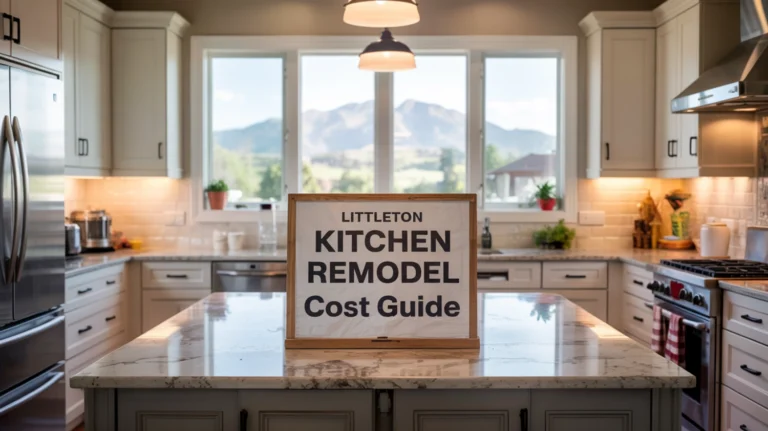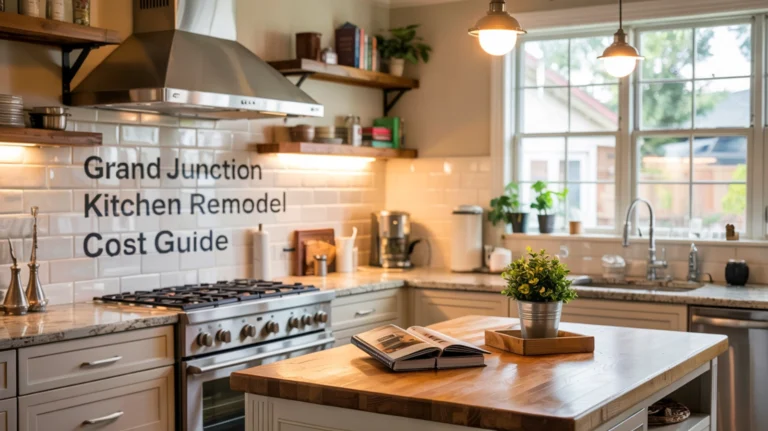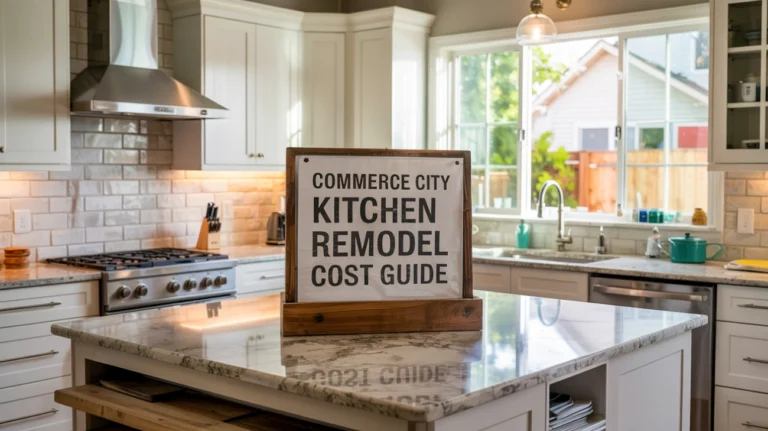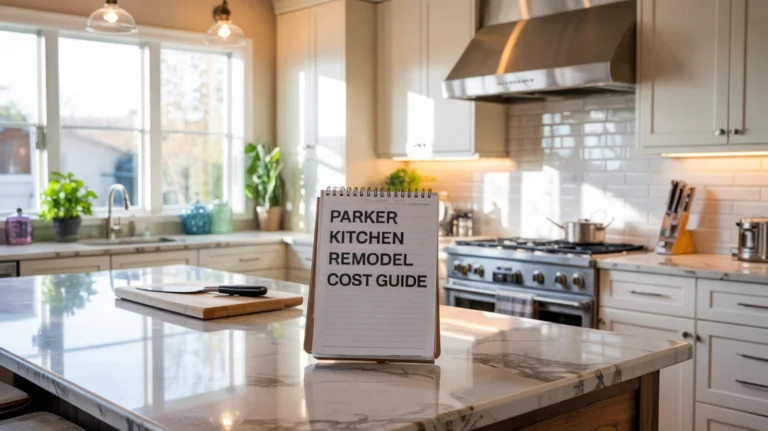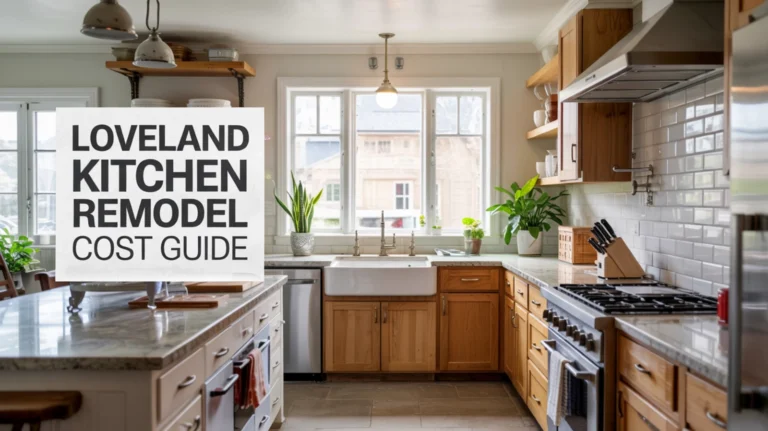Renovating a kitchen in Lakewood isn’t like remodeling one in Castle Rock or Boulder—our local market has its own quirks, from the prevalence of mid-century homes along 6th Avenue to the specific building codes enforced by our permit office. What looks like a simple cabinet refresh can quickly become a full electrical upgrade once you open those 1960s walls.
So what’s the damage going to be for your Lakewood kitchen dreams?
The average kitchen remodel cost in Lakewood, Colorado ranges from $15,000 to $48,000. Basic remodels may start at $11,000, while full-scale renovations with high-end materials, custom features, and layout changes can exceed $65,000 depending on labor and design complexity.
Kitchen Remodel Cost Estimator for Lakewood
Lakewood Kitchen Remodel Cost Calculator
Get an estimate for your kitchen renovation based on your specifications.
Estimated Kitchen Remodel Cost
This estimate is based on national averages and may vary based on your location, material availability, contractor rates, and other factors. Prices are estimates only and should be used for planning purposes.
Looking for more accurate costs in your area? Search for location-specific remodel costs.
Overall Project Cost Ranges
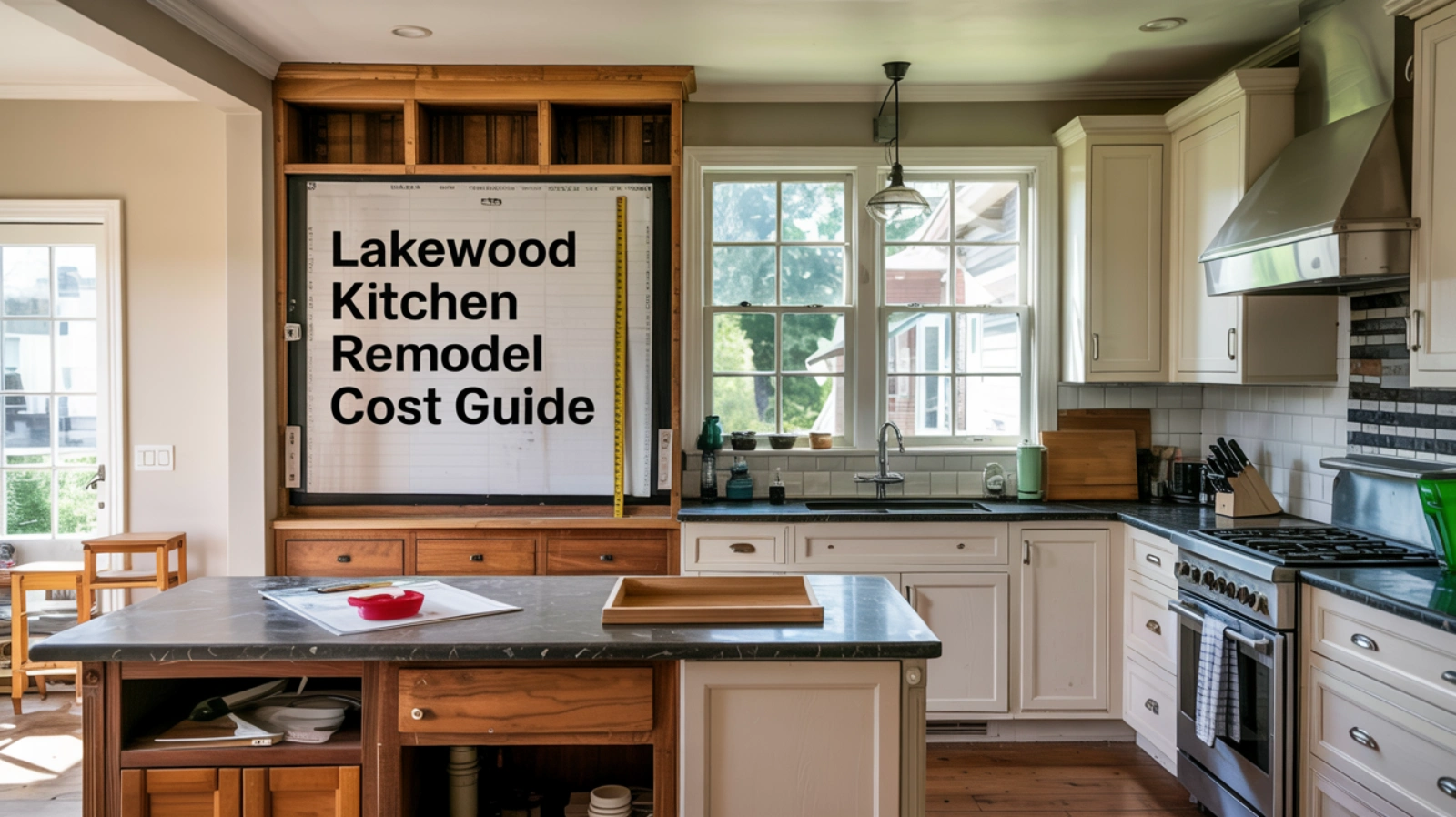
Thinking about renovating your kitchen in Lakewood or somewhere in the Denver metro area? You’re probably wondering what this adventure might cost you.
The truth is, kitchen remodel costs swing dramatically based on three major factors: size, scope, and the materials you choose. While “cost per square foot” gets tossed around as a handy metric, your specific choices will ultimately drive what you’ll spend.
Cost per Square Foot Estimates
So what are people actually paying for kitchen renovations around Denver? The numbers tell an interesting story of just how varied these projects can be:
One Denver source suggests you’ll likely spend between $190 and $375 per square foot. That’s a pretty wide range, right?
Another estimate brings it down to $100 to $250 per square foot, with basic cosmetic refreshes potentially costing as little as $75 per square foot. That’s the difference between a simple update and a complete transformation.
Want to know what drives these numbers up or down? Cabinets play a huge role. Contractor guides estimate $190-$240 per square foot for kitchens with store-bought cabinets, but jump to $300-$375 when you opt for custom cabinet work.
Some broader Colorado estimates cite figures between $15-$60 per square foot, though let’s be honest—these lower figures probably represent minimal touch-ups rather than true renovations.
For comparison, if you were building a completely new kitchen addition to your home in Denver, you’d be looking at $125 to $250 per square foot, with kitchen-specific additions running on the higher end at $200-$250 per square foot.
The dramatic swings in these numbers—from $75 all the way up to $375 or more per square foot—highlight how finish quality and project complexity transform your bottom line. Higher costs directly connect to luxuries like custom cabinetry and premium materials, while lower estimates might only cover basic updates.
What’s the takeaway? Average per-square-foot numbers only tell part of the story without defining whether you’re aiming for basic, mid-range, or luxury results. Your specific choices regarding materials and whether you’re moving walls will ultimately determine where you land in these ranges.
Kitchen Remodel Cost Per Square Foot (Denver Metro Area)
| Source/Scope | Reported Cost Range ($/sq ft) | Source Snippet ID(s) |
|---|---|---|
| Denver Remodel (General) | $190 – $375 | 1 |
| Denver Remodel (General) | $100 – $250 | 2 |
| Basic Cosmetic Remodel | $75 (Lower End) | 2 |
| New Kitchen (Store Cabinets) | $190 – $240 | 3 |
| New Kitchen (Custom Cabinets) | $300 – $375 | 3 |
Costs by Remodel Scale (Minor, Mid-Range, Upscale)
When budgeting for your kitchen transformation, thinking in terms of project scale provides a clearer picture than square footage alone. Let’s break down what you might expect to pay based on how extensive your renovation plans are.
Minor/Basic Remodels: The Refresh
What counts as a “minor” remodel? Think cosmetic updates—painting cabinets, swapping out hardware, or installing new light fixtures without changing your kitchen’s layout.
In Denver, these refreshes typically run between $7,000 to $10,000. Other Colorado sources suggest slightly different ranges: $5,000-$15,000 or $8,000-$20,000 depending on exactly what you’re updating.
Here’s where things get interesting: the national average for a minor kitchen remodel in 2024 sits much higher at approximately $27,492. Why the difference? The “national minor remodel” definition likely includes more substantial updates like replacing countertops or appliances, while the lower Denver estimates might cover a more limited scope.
Mid-Range Remodels: The Transformation
Ready for something more substantial? Mid-range remodels typically involve replacing most kitchen components—cabinets, countertops, appliances, and flooring—while keeping the existing layout relatively intact.
This is where Denver estimates really start to diverge:
- Some sources quote $11,000 to $25,000
- Others suggest $15,000 to $50,000
- More comprehensive estimates place it at $40,000 to $75,000
- One Denver builder even estimates $100,000 to $150,000 for what they consider “mid-range”
For comparison, national averages for major mid-range kitchen remodels in 2024 land around $77,939 – $79,982—right in the middle of these varied Denver ranges.
Upscale/Major/Luxury Remodels: The Complete Reimagining
What takes a kitchen remodel into “luxury” territory? These are comprehensive renovations that might include layout changes, structural modifications, custom cabinetry, high-end materials like stone countertops, premium flooring, professional-grade appliances, and sophisticated lighting systems.
For these dream kitchens, Denver estimates start from $26,000 to $50,000+ at the lower end of “complete renovation” definitions, climbing all the way to $38,000 to $150,000+. Other Colorado sources place large-scale remodels at $75,000-$150,000+ or $50,000-$150,000.
Want to go all out? A Denver builder estimates luxury kitchen projects from $150,000 to $300,000+. The 2024 national average for major upscale remodels sits at approximately $158,530, with a typical Denver renovation range cited as $30,000 to $175,000.
The dramatic variation in cost estimates—particularly for “mid-range” projects that span from $11,000 to $150,000 in Denver—highlights how differently these categories are defined by various sources (or possibly reflects rapid market changes). National figures often fall somewhere between the lowest and highest local estimates.
The key takeaway? Don’t get too hung up on labels like “minor,” “mid-range,” or “upscale.” Instead, focus on the specific features included in each estimate (cabinet type, appliance grade, layout changes) to understand what you’re actually getting for your money.
Kitchen Remodel Costs by Scale (Denver Metro Area)
| Scale | Reported Cost Range ($) | Key Features Included (Examples) |
|---|---|---|
| Minor / Basic | $7,000 – $10,000 | Refreshing vs. replacing; painting cabinets, new hardware, basic cosmetic changes |
| Minor / Low-End | $5,000 – $15,000 | Cosmetic changes, paint, new lighting, updated hardware, more DIY elements |
| Mid-Range | $11,000 – $25,000 | Higher quality materials, replaces most elements (floor, cabinets), no layout change |
| Mid-Range | $15,000 – $50,000 | New appliances, cabinets, countertops, possible minor layout changes |
| Mid-Range | $40,000 – $75,000 | Premium countertops, energy-efficient appliances, updated cabinetry |
| Mid-Range (Builder Est.) | $100,000 – $150,000 | New semi-custom cabinets, granite/quartz counters, mid-grade stainless appliances, updated lighting, tile backsplash, new flooring |
| Upscale / Major / Luxury | $38,000 – $150,000+ | Significant layout changes, custom cabinetry, premium appliances, top-of-the-line options |
| Upscale / Major / Luxury | $75,000 – $150,000+ | High-end finishes, structural modifications, luxury appliances, custom-built cabinetry |
| Upscale / Luxury (Builder) | $150,000 – $300,000+ | Custom cabinets, high-end counters (marble, premium quartz), top-line appliances, designer lighting, significant layout changes |
| Complete Renovation | $26,000 – $50,000+ | Gutting to studs, redesign process |
| National Minor (2024) | ~$27,492 | Replace cabinet fronts, hardware, laminate counters, mid-priced sink/faucet, resilient flooring, paint |
| National Major Mid (2024) | ~$79,982 | Semi-custom wood cabinets, island, laminate counters, standard sink/faucet, energy-efficient appliances, custom lighting, flooring |
| National Major Upscale(24) | ~$158,530 | Custom cabinets, stone counters, tile backsplash, undermount sink, designer faucet, built-in/commercial grade appliances, lighting |
Costs by Kitchen Size (Small, Medium, Large)
Does size really matter when it comes to kitchen remodels? Absolutely—but perhaps not as much as you might think. Let’s break down what Lakewood homeowners are paying based on kitchen dimensions.
Small Kitchens (70-100 sq ft): Compact Doesn’t Mean Cheap
Working with a cozy kitchen between 70 and 100 square feet? Denver estimates for remodeling these spaces range from $13,300 to $37,500.
Another Colorado source suggests $20,000 to $40,000 for cosmetic work in small kitchens, but warns that costs can easily exceed $50,000 once you start considering structural modifications or high-end materials.
Nationally, a 100 sq ft (10×10) kitchen remodel—about the size of a standard bedroom—might cost $5,000-$15,000 for basic updates, $15,000-$50,000 for mid-range renovations, and $50,000+ for high-end transformations. General estimates place these projects between $16,000–$45,000.
Medium Kitchens (100-200 sq ft): The Sweet Spot
For medium-sized kitchens between 100 and 200 square feet, Denver homeowners typically spend between $19,000 and $75,000. Another Colorado source narrows this estimate to $40,000 to $75,000.
Looking at national figures, a 150 sq ft kitchen remodel generally falls between $24,000 and $67,500—right in line with the Denver ranges.
Large Kitchens (200+ sq ft): Room to Splurge
Got a spacious kitchen exceeding 200 square feet? Denver projects in this category typically run between $55,000 and $112,500+. Another Colorado source indicates that costs for large kitchen renovations commonly exceed $100,000.
National estimates suggest $32,000–$90,000 for a 200 sq ft kitchen, climbing to $48,000–$135,000 for a generous 300 sq ft space.
While costs generally increase with kitchen size, there’s something fascinating happening with the upper ranges. The boundaries between different size categories overlap significantly.
For instance, a high-end small kitchen involving structural changes could cost upwards of $50,000—exceeding the entry point for a basic medium kitchen remodel at $19,000.
What does this tell us? The level of renovation—whether you’re doing a cosmetic refresh versus gutting the space, the quality of materials, appliance grades, and structural complexity—exerts greater influence on your final bill than square footage alone.
This is particularly true for smaller kitchens, where achieving desired functionality might require more intricate (and costly) design solutions to maximize limited space.
Kitchen Remodel Costs by Size (Denver Metro Area)
| Size Category | Typical Sq Ft Range | Reported Cost Range ($) |
|---|---|---|
| Small | 70-100 sq ft | $13,300 – $37,500 |
| Small (Cosmetic) | 70-100 sq ft | $20,000 – $40,000 |
| Small (Structural/Luxury) | 70-100 sq ft | $50,000+ |
| 10×10 (National Low) | 100 sq ft | $5,000 – $15,000 |
| 10×10 (National Mid) | 100 sq ft | $15,000 – $50,000 |
| 10×10 (National High) | 100 sq ft | $50,000+ |
| Medium | 100-200 sq ft | $19,000 – $75,000 |
| Medium | 100-200 sq ft | $40,000 – $75,000 |
| Large | 200+ sq ft | $55,000 – $112,500+ |
| Large | 200+ sq ft | $100,000+ |
Cost Breakdown by Component
Ever wondered where your kitchen remodel budget actually goes? Understanding how funds typically get distributed across different elements can help you prioritize what matters most to you.
Typical Allocation Percentages
Based on Denver-specific data, here’s how your kitchen remodel budget might break down:
● Cabinets: 29%
● Installation and Labor: 17%
● Appliances and Ventilation: 14%
● Countertops: 10%
● Flooring: 7%
● Lighting and Electrical: 5%
● Plumbing and Faucets: 4-6%
● Backsplash: 5%
● Walls and Ceilings: 5%
● Doors and Windows: 4%
● Miscellaneous (Design, Permits, Contingency): 5%
Notice something interesting? Cabinets consistently represent the largest material expenditure, sometimes reaching up to 50% of the total budget in high-end projects. Labor follows as the second-largest overall cost component.
What’s the practical takeaway here? Decisions about cabinet type (stock, semi-custom, or custom) and selecting an efficient, appropriately priced contractor will have the biggest impact on your final budget. Appliances and countertops represent the next tier of major expenses.
Average Kitchen Remodel Cost Allocation (Denver Metro)
| Component | Average Budget Percentage | Source Snippet ID(s) |
|---|---|---|
| Cabinets | 29% | 1 |
| Installation and Labor | 17% | 1 |
| Appliances and Ventilation | 14% | 1 |
| Countertops | 10% | 1 |
| Flooring | 7% | 22 |
| Lighting | 5% | 22 |
| Backsplash | 5% | 22 |
| Walls and Ceilings | 5% | 22 |
| Doors and Windows | 4% | 22 |
| Faucets and Plumbing | 4% | 22 |
| Misc. | 5% | 1 |
Component Cost Ranges
Let’s get specific about what major kitchen elements actually cost in the Denver market. These concrete figures will help you build a realistic budget:
Cabinets: The Budget Heavyweight
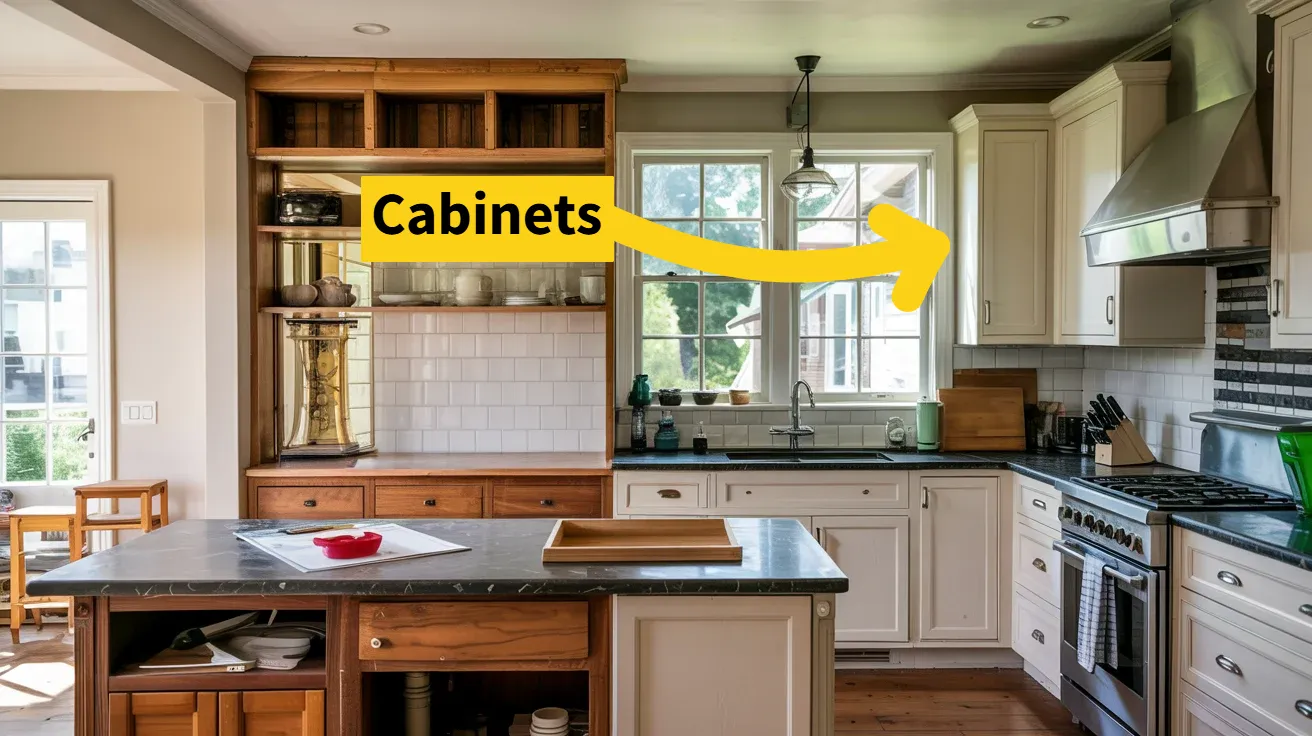
Total cabinet costs in Denver can range anywhere from $25,000 to $75,000 according to one source. When broken down by linear foot (installed), the difference between types becomes clear:
- Stock cabinets: $100-$300 per linear foot
- Semi-custom: $150-$650 per linear foot (potentially up to $1,000)
- Custom: $500-$1,200 per linear foot
Installation labor adds another $50-$450 per linear foot.
Want local cabinet options? Denver suppliers offering various cabinet lines include BKC Kitchen & Bath (Crystal Cabinets), Republic Elite, and Highland Cabinetry Colorado. Many offer KCMA certified options for quality assurance.
Countertops: The Visual Centerpiece
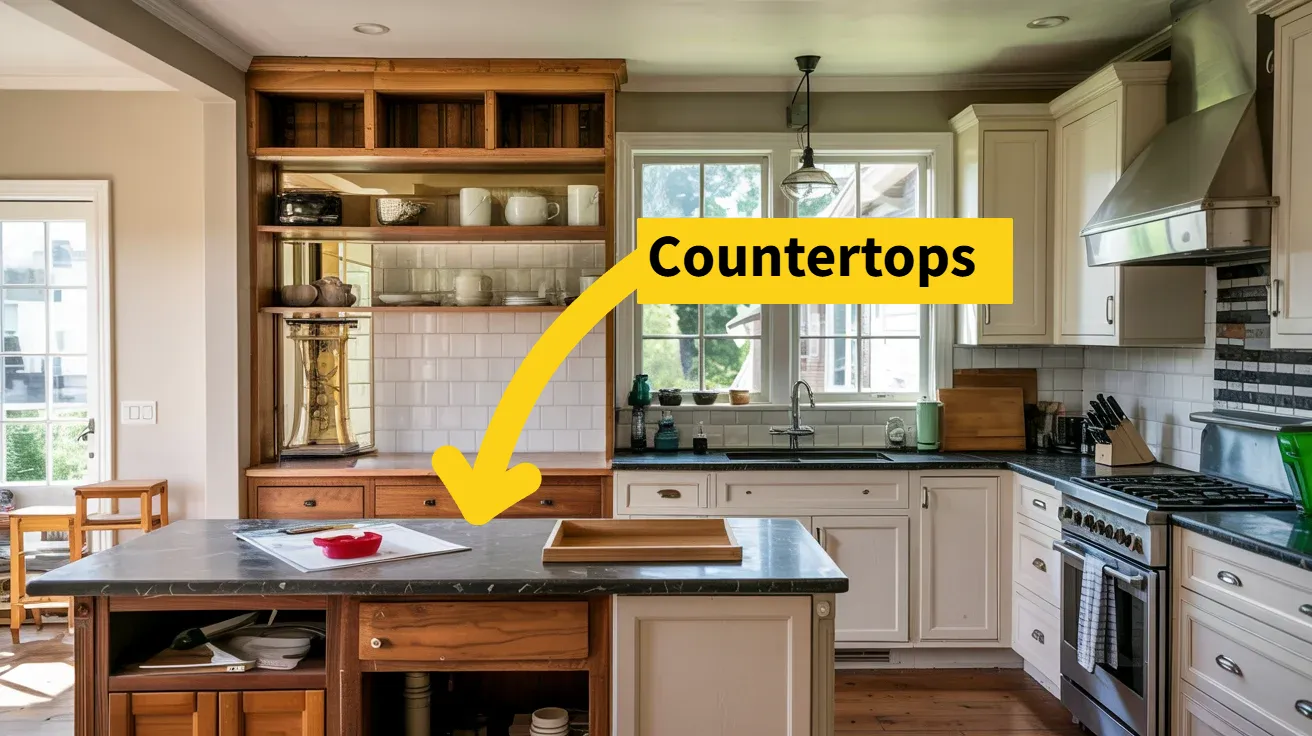
Countertops typically represent about 10% of your budget, with Denver estimates ranging from $2,500 to $11,500 total, or $3,000 to $4,200 according to another source.
The material you choose dramatically impacts cost per square foot:
- Laminate: $10-$40
- Granite: $40-$100+
- Quartz: $50-$200
- Marble: $12-$180
Denver quartz installation averages $125 per square foot (total cost), including material ($50-$200/sq ft) and labor ($10-$30/sq ft or $35-$85/hour). Don’t forget to budget for edge treatments ($5-$40/linear foot) and removal of old countertops ($5-$15/sq ft).
Several suppliers serve the Denver area, including Granite Depot, YK Stone Center, Colorado Granite, Front Range Stone Countertops, and Tony’s Granite and Quartz.
Appliances: Function Meets Style
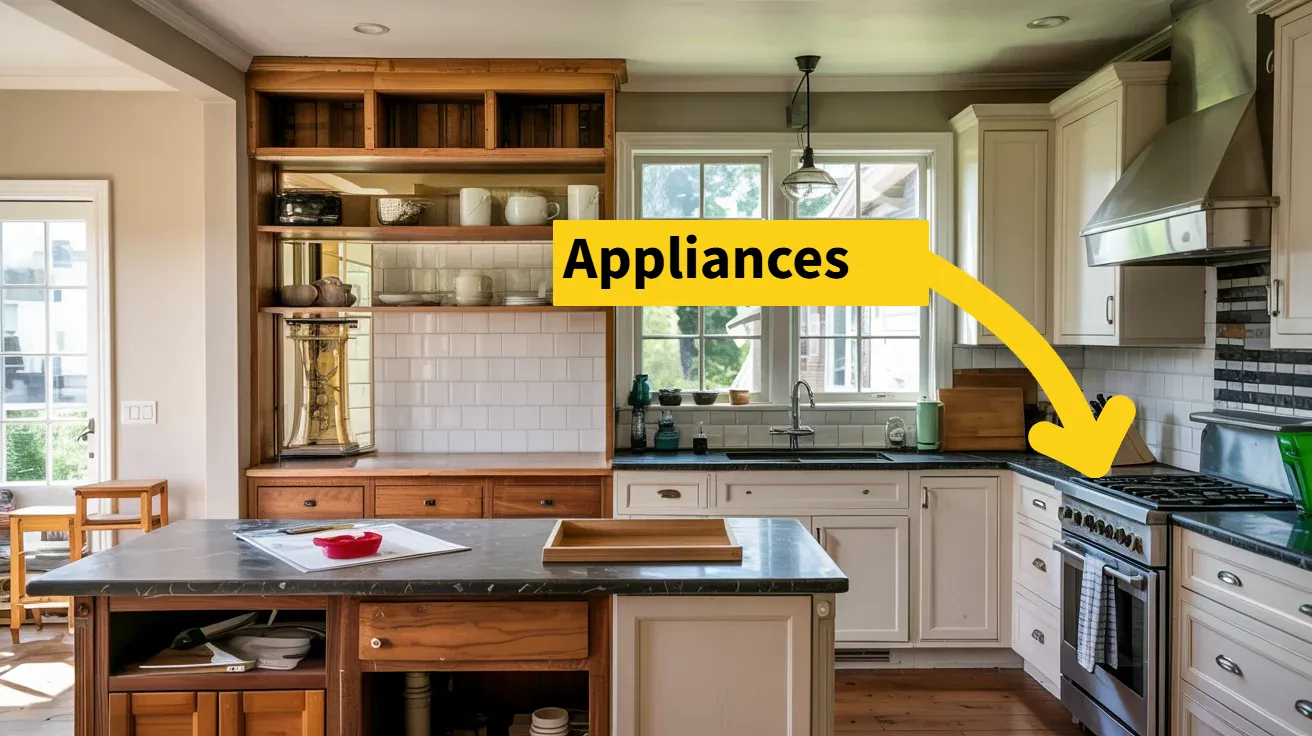
Appliances constitute approximately 14% of your budget, with total costs in Denver estimated between $4,500 and $24,700.
Individual mid-range appliance costs typically range from a few hundred dollars for microwaves or disposals to several thousand for refrigerators, ranges, and ovens. High-end appliances, such as professional-style ranges, can individually exceed $10,000.
For labor, national estimates place appliance installation between $3,000-$6,000.
Flooring: The Foundation
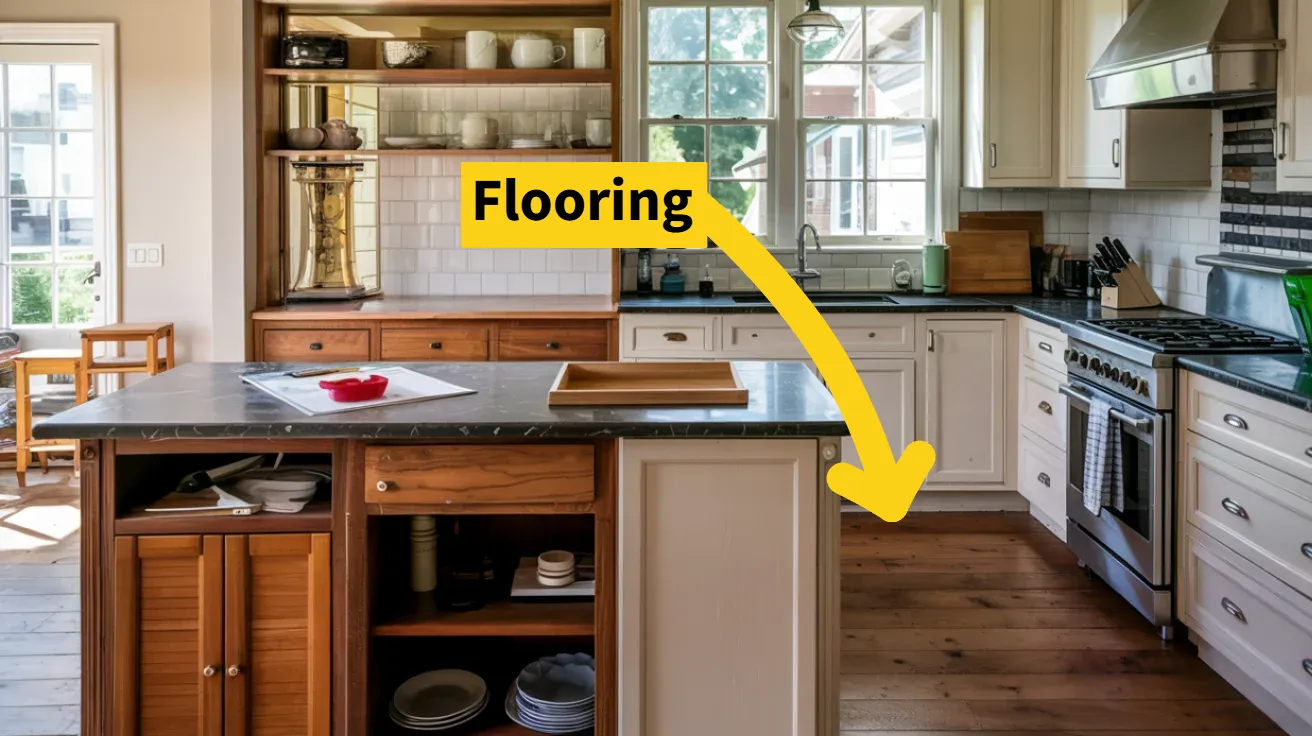
Flooring accounts for roughly 7% of the budget, with total Denver costs estimated at $1,800 to $4,600.
Installed costs per square foot vary significantly by material:
- Vinyl Sheet: $2-$7
- LVP/LVT: $4-$16
- Laminate: $4-$14
- Tile: $10-$50
- Hardwood: $11-$25
Labor: The Skilled Hands
Labor represents approximately 17% of the total budget. General Colorado remodeler rates range from $80-$150 per hour, with specific trade rates varying (see the Labor Costs section for detailed breakdowns).
Permits: The Legal Necessity
Denver permit costs typically range from $150-$500 or $200-$2,500, varying with project valuation. Lakewood’s specific fee structure based on valuation is detailed in the Permitting section.
Other Components
Other elements to budget for include:
- Backsplash: $1,900-$4,500
- Kitchen Island: $4,000-$8,000
- Plumbing Fixtures and Lighting: $2,500-$7,000
Return on Investment (ROI) for Lakewood Kitchen Remodels
Thinking about your kitchen remodel as an investment? Smart move. Let’s explore how much of your renovation costs you might recoup when selling your home.
%%{init: {'theme': 'neutral', 'themeVariables': {'primaryColor': '#8FBC8F', 'primaryTextColor': '#000', 'primaryBorderColor': '#4A6741'}}}%%
flowchart TB
A[Minor Kitchen Remodel] --> |96.1% ROI| B[Avg. Cost: $27,492]
C[Mid-Range Kitchen Remodel] --> |49.5% ROI| D[Avg. Cost: $79,982]
E[Upscale Kitchen Remodel] --> |38.0% ROI| F[Avg. Cost: $158,530]
G[Key Insights]
G --> |High Impact| H[Minor remodels recoup nearly entire investment]
G --> |Value Consideration| I[Upscale renovations add dollar value but lower % ROI]
style A fill:#90EE90,stroke:#333,stroke-width:2px
style C fill:#20B2AA,stroke:#333,stroke-width:2px
style E fill:#008080,stroke:#333,stroke-width:2px
style G fill:#F0FFF0,stroke:#4A6741,stroke-width:2pxMost ROI data comes from the widely respected Remodeling Magazine Cost vs. Value Report, which tracks project costs and resale values across different markets.
ROI Percentages by Remodel Scale (Denver/Mountain Region)
Ever noticed how some renovations seem to pay off better than others? The percentage of cost recouped varies dramatically based on your project’s scope and budget.
Minor Kitchen Remodel: The ROI Champion
If maximum return is your priority, minor kitchen updates consistently deliver the highest ROI:
- The 2024 national average ROI was an impressive 96.1% on an average project cost of $27,492.
- Denver-specific data from 2024 mirrors this national figure with 96.1% ROI on a $27,492 investment.
- Earlier reports for Denver cited ROI as high as 97% (2020) and 80.5% (2019).
What makes minor remodels such winners? They focus on high-impact, cosmetic changes that dramatically improve appearance without the hefty price tag of structural work.
Mid-Range Major Kitchen Remodel: The Middle Ground
Mid-range major renovations offer moderate but still respectable returns:
- The 2024 national average ROI was 49.5% on an average project cost of $79,982. Some sources cite 41.8% on a $77,939 cost.
- Denver-specific data from 2024 indicates an ROI of 49.5% on a $79,982 cost.
- Another source cites 67.2% for the broader Mountain region.
- Earlier Denver reports showed ROI at 75% (2020) and 62.1% (2019).
Note: Some sources present conflicting midrange ROI figures (49.5% and 74.8%)—the lower figure aligns with national data.
Upscale Major Kitchen Remodel: Luxury at a Cost
Upscale major renovations yield the lowest percentage ROI despite adding significant absolute value:
- The 2024 national average ROI was 38.0% on an average project cost of $158,530.
- Denver-specific data from 2024 mirrors the national average at 38.0% ROI on a $158,530 cost.
- An earlier Denver report cited 59.7% ROI.
The pattern is clear and consistent across years and regions: as project cost and complexity increase, percentage ROI decreases. Minor remodels, focusing on high-impact cosmetic updates, recoup nearly their entire investment. In contrast, major upscale renovations, while adding substantial absolute dollar value, are less efficient from a pure cost-recouped percentage standpoint.
What does this tell us? While buyers highly value updated kitchens, their willingness to pay a premium may not fully cover the expense of high-end, highly personalized selections.
It’s worth noting that ROI figures show volatility over time and regional differences. The 2024 Cost vs. Value report noted a surge in ROI for exterior projects nationally, while interior projects showed mixed results. The Mountain region reportedly had lower average ROIs in 2024 compared to its performance in the prior year, although specific Denver figures for major remodels remained relatively strong.
Kitchen Remodel ROI Summary (Denver/Mountain Region vs. National)
| Remodel Scale | Data Year | Reported ROI (%) (Denver/Mountain) | National Avg ROI (%) | Project Cost | Source Snippet ID(s) |
|---|---|---|---|---|---|
| Minor Midrange | 2024 | 96.1% (Denver) | 96.1% | $27,492 | 10 |
| Minor Midrange | 2020 | 97% – 97.4% (Denver) | N/A | $22,665 (Denver) | 43 |
| Major Midrange | 2024 | 49.5% (Denver) / 67.2% (Mountain) | 49.5% | $79,982 | 11 |
| Major Midrange | 2023 | N/A | 41.8% | $77,939 | 17 |
| Major Midrange | 2020 | 72% – 75% (Denver) | N/A | $66,621 (Denver) | 43 |
| Major Upscale | 2024 | 38.0% (Denver) | 38.0% | $158,530 | 11 |
| Major Upscale | 2023 | N/A | 31.7% | $154,483 | 17 |
Factors Influencing ROI
Several variables impact the financial return of your kitchen remodel:
Scope and Scale: Minor updates focusing on cost-effective, high-visibility changes (like cabinet refacing, new countertops, hardware) generally yield higher percentage returns compared to major renovations involving structural alterations.
Material Quality: Selecting durable, widely appealing mid-range materials like quartz countertops or stainless steel appliances often optimizes ROI. Using excessively expensive, highly customized, or niche materials may not be fully recovered in the resale price, especially if inconsistent with the home’s overall value.
Local Real Estate Market: In a competitive market like Denver, where updated kitchens are highly desirable, remodels can significantly enhance saleability and value. Market fluctuations, including inventory levels and mortgage rates, influence buyer demand and price sensitivity.
Time Horizon: ROI tends to be highest within the first few years following the renovation, as styles and conditions remain current.
Quality of Workmanship: Professional installation and finishing are crucial for ensuring the remodel’s longevity and perceived value.
Lakewood Permitting and Building Codes
Planning to knock down a wall or rewire your kitchen? You’ll need to navigate Lakewood’s regulatory landscape first. Understanding permits and codes isn’t the most exciting part of renovation, but it’s crucial for ensuring your project is legal, safe, and won’t cause headaches when you eventually sell your home.
Permitting Requirements for Lakewood Kitchen Remodels
When do you need a permit in Lakewood? And how do you get one? Let’s break it down.
Permit Triggers
Generally, permits are necessary for any work involving construction, alteration, repair, or system modifications (electrical, plumbing, mechanical).
While minor cosmetic tasks like painting or tiling might be exempt, City of Lakewood guidance indicates that all construction work beyond very minor cosmetic updates requires a building permit. This includes electrical, plumbing, and mechanical work associated with a kitchen remodel.
Structural alterations? Always need a permit. No exceptions.
Still not sure if your project needs a permit? It’s always best to confirm with the City for your specific project scope. A quick call can save you from potential fines or complications later.
Application Process
Who applies? Owners of single-family detached homes performing the work themselves may obtain the permit. If contractors are hired, they must be registered with the City of Lakewood and are responsible for securing the permit.
How to submit: Applications require project valuation (including estimated labor and material costs) and typically two sets of plans. The City utilizes the Lakewood.org/eTRAKiT online portal for permit applications, fee payments, and inspection scheduling by both homeowners and registered contractors.
Systems permits: Separate permits for electrical, mechanical, and plumbing work are needed if the homeowner is performing these tasks. Fees for these are often bundled with the main building permit fee.
Permit Fee Structure
How much will that permit cost you? Fees are calculated based on the total project valuation (labor plus materials). The City of Lakewood uses a tiered fee schedule based on valuation ranges.
The schedule effective January 1, 2021, is detailed below. Always verify current fees with the Permit Counter, as schedules change periodically.
Something to note: the city compares your stated valuation against standard valuation tables (ICC or City tables) and uses the higher value for fee calculation. In other words, you can’t lowball your project value to save on permit fees!
Table 6: City of Lakewood Building Permit Fee Schedule (Based on Jan 2021 Data)
| Total Project Valuation Range ($) | Building Permit Fee ($) |
|---|---|
| $1.00 to $500.00 | $26.00 |
| $501.00 to $2,000.00 | $26.00 for first $500 + $3.45 per additional $100 or fraction thereof |
| $2,001.00 to $25,000.00 | $77.75 for first $2,000 + $13.80 per additional $1,000 or fraction thereof |
| $25,001.00 to $50,000.00 | $395.15 for first $25,000 + $9.20 per additional $1,000 or fraction thereof |
| $50,001.00 to $100,000.00 | $625.15 for first $50,000 + $6.90 per additional $1,000 or fraction thereof |
| $100,001.00 to $500,000.00 | $970.15 for first $100,000 + $5.75 per additional $1,000 or fraction thereof |
| $500,001.00 to $1,000,000.00 | $3270.15 for first $500,000 + $4.60 per additional $1,000 or fraction thereof |
| $1,000,001.00 and up | $5570.15 for first $1,000,000 + $3.45 per additional $1,000 or fraction thereof |
City of Lakewood Building Division Contact Information
Need to reach out directly? Here’s how:
- Location: Permit Counter – Public Works Department, Civic Center North, 470/480 S Allison Pkwy, Lakewood, CO 80226
- Phone: 303-987-7500
- Email: [email protected]
- Inspections: Request via phone at 303-987-7768 or online via eTRAKiT
- Online Portal: www.Lakewood.org/eTRAKiT
Applicable Building Codes
All permitted construction work must comply with the specific building codes adopted by the City of Lakewood. These codes aren’t suggestions—they’re requirements.
Adopted Codes and Versions (Effective 2024)
The City of Lakewood enforces the following code editions relevant to residential kitchen remodels:
- 2021 International Residential Code (IRC)
- 2023 National Electrical Code (NEC)
- 2021 International Plumbing Code (IPC)
- 2021 International Mechanical Code (IMC)
- 2021 International Fuel Gas Code (IFGC)
- 2021 International Energy Conservation Code (IECC)
- 2021 International Existing Building Code (IEBC)
Key Local Design Loads
Structural and system design must account for Lakewood’s specific environmental conditions:
- Frost Depth: 36 inches
- Ground Snow Load: 30 psf (non-reducible)
- Minimum Roof Snow Load: 30 psf
- Wind Speed (Ultimate – Vult): 166 mph (Risk Category II, West of Kipling St.)
- Seismic Design Category: B (Residential)
Local Amendments
Modifications to these standard codes are codified in Title 14 of the Lakewood Municipal Code. While the existence of Title 14 and its chapters related to building, plumbing, and electrical codes is confirmed, the provided research doesn’t detail specific technical amendments relevant to kitchen remodels. Consultation of the official Lakewood Municipal Code is necessary to identify any specific local requirements beyond the base codes.
Why does all this code stuff matter for your renovation? Adherence to current codes (2021 I-Codes, 2023 NEC) is mandatory for all permitted work. This ensures safety and performance, but it can sometimes drive up project costs.
Newer codes often incorporate stricter requirements for elements like electrical circuit protection (GFCI/AFCI), energy efficiency standards, and plumbing configurations compared to what might exist in Lakewood’s older housing stock.
This is especially relevant if you live in an older home. Your existing kitchen might have been built to code decades ago, but bringing everything up to current standards during renovation can add unexpected costs to your project.
Any contractor working on your Lakewood kitchen remodel should possess working knowledge of these specific code editions and local amendments detailed in Title 14. Don’t be shy about asking them about their familiarity with Lakewood-specific building requirements.
Material and Labor Costs in the Lakewood Market
Let’s talk numbers. Accurate budgeting for your Lakewood kitchen remodel means understanding what materials and skilled labor actually cost in your local market, not just national averages.
Common Material Costs and Standards
The price tags on essential kitchen components can vary dramatically depending on quality, style, and where you buy them.
Cabinetry: The Budget Monster
Remember how cabinets can eat up to 50% of your budget? The price per linear foot installed ranges dramatically:
- Stock cabinets: $100-$300
- Semi-custom: $150-$650 (sometimes reaching $1,000)
- Custom: $500-$1,200
Looking for quality assurance? The Kitchen Cabinet Manufacturers Association (KCMA) certification signifies adherence to construction and finish durability standards.
Local suppliers like BKC Kitchen & Bath offer KCMA-certified lines, including eco-friendly options meeting Environmental Stewardship Program (ESP) criteria (e.g., no added urea-formaldehyde plywood, low-VOC finishes). Republic Elite also provides KCMA-certified cabinets locally.
Countertops: The Focal Point
Material costs per square foot show why your countertop choice is such a significant decision:
- Granite: $40-$100+
- Quartz: $50-$200
- Marble: $12-$180
- Laminate: $10-$40
And don’t forget to add installation labor as an additional cost.
Granite earns praise for durability, while quartz offers both durability and design versatility. Reputable local suppliers include Granite Depot, YK Stone Center, Colorado Granite, Front Range Stone Countertops, and Tony’s Granite and Quartz.
While specific ASTM standards weren’t identified in the research for countertops, sourcing from established suppliers generally ensures access to standard industry grades and quality fabrication.
Flooring: The Foundation
What you walk on matters—both for aesthetics and practicality. Installed costs per square foot depend heavily on material choice:
- Luxury Vinyl Plank/Tile (LVP/LVT): $4-$16
- Sheet Vinyl: $2-$7
- Laminate: $4-$14
- Ceramic/Porcelain Tile: $10-$50
- Hardwood: $11-$25
Vinyl options frequently win the kitchen flooring popularity contest due to their excellent water resistance—a key consideration in spaces prone to spills.
These wide price ranges across materials like cabinets and countertops offer significant budgeting flexibility. However, opting for materials that meet recognized quality standards, such as KCMA-certified cabinets, ensures better performance and longevity in a high-use environment like your kitchen.
The sweet spot? Balancing your aesthetic vision and budget constraints with established quality benchmarks for the best long-term value.
Average Labor Rates
Labor costs represent approximately 17% of your total remodel budget—a significant chunk that’s easy to underestimate.
General Contractor (GC)
Rather than charging hourly, GCs typically embed their rates in the total project cost via markup. Typical GC gross margins on remodeling projects range from 25% to 40%, covering overhead (insurance, office costs, supervision) and profit.
A markup of 10-20% (or higher) on direct costs (materials, subcontractors) is standard practice. Net profit margins are typically much lower, often around 5%.
When GCs do charge hourly in Colorado, rates typically range from $80-$150.
Licensed Electrician
Need to update your kitchen’s electrical system? Hourly rates in Colorado show considerable variation:
- $40-$150 (general range)
- $66-$80 (typical specialty contractor)
- $28.56 (25th percentile) to $41.44 (75th percentile) with an average of $35.83 for licensed electricians
- $30.10 (25th percentile) to $45.48 (75th percentile) with an average of $40.41 for Master Electricians
A Lakewood-specific average is reported at $32.50.
Licensed Plumber
Plumbing costs also span a wide range:
- $70-$79 (typical specialty contractor)
- $30 average for Journeyman in Denver
- $102 regular rate quoted by a Denver company in 2020
- General estimates range $90-$200
Be aware that minimum service charges are common, regardless of job size.
The substantial variability in reported hourly rates for skilled trades (with plumber rates ranging from $30/hr to $102/hr or higher) highlights how factors like experience level (Journeyman vs. Master), company size and overhead, task complexity, and market demand all influence pricing.
What’s the takeaway for your project? Always obtain multiple detailed quotes, clarify whether pricing is hourly or project-based, and understand how GC fees or markups apply to subcontractor costs.
Average Hourly Labor Rates (Denver/Lakewood Area)
| Trade | Reported Hourly Rate Range ($) | Notes | Source Snippet ID(s) |
|---|---|---|---|
| General Contractor/Remodeler | $80 – $150 | General CO rate; often uses markup instead | 15 |
| Licensed Electrician | $66 – $80 | Typical CO Specialty Contractor Rate | 64 |
| Licensed Electrician | $28.56 – $41.44 | 25th-75th Percentile CO; Avg $35.83 | 65 |
| Licensed Electrician | $40 – $150 | General CO Range | 63 |
| Master Electrician | $30.10 – $45.48 | 25th-75th Percentile CO; Avg $40.41 | 66 |
| Journeyman Plumber | $70 – $79 | Typical CO Specialty Contractor Rate | 64 |
| Journeyman Plumber | ~$30 | Average Denver Rate | 68 |
| Licensed Plumber | $90 – $200 | General Estimate; Minimums common | 70 |
| Licensed Plumber | ~$102 | Denver Rate Quoted 2020 | 69 |
Local Factors Influencing Lakewood Kitchen Remodels
Every real estate market has its own unique character, and Lakewood is no exception. Understanding the distinctive characteristics of Lakewood’s housing market, design preferences, and economic conditions can help you make smarter decisions for your kitchen renovation.
Common Home Styles and Age in Lakewood
The nature of Lakewood’s existing housing stock directly impacts what you might encounter during your remodel.
Ever notice how many mid-century homes dot the landscape along 6th Avenue? There’s a notable presence of homes built between the 1940s and 1970s in this corridor.
In neighborhoods like Carmody, residential development predominantly occurred during the 1970s, featuring architectural styles such as split-levels, tri-levels, and ranch homes.
The prevalence of homes built 40-70+ years ago isn’t just an interesting historical footnote—it has practical implications for your renovation plans.
What does this mean for your kitchen remodel? Many Lakewood renovations involve more than just cosmetic updates. You’re likely to encounter original, outdated electrical, plumbing, and HVAC systems that need upgrading to meet current building codes (2021 IRC/IPC/IMC, 2023 NEC).
These necessary system upgrades can introduce significant costs beyond your initial aesthetic vision. Older homes may also present structural challenges or require remediation of hazardous materials, adding complexity and expense to what seemed like a straightforward project.
Local Design Preferences and Trends
What’s trending in Lakewood kitchens these days? Current aesthetic preferences influence both your enjoyment of the space and its potential resale appeal.
The Denver/Lakewood market has shown a clear shift towards warm, natural aesthetics. Those cool grays that dominated for years? They’re giving way to earth tones (beige, taupe, deep greens) and rich wood finishes.
Homeowners are embracing texture and depth through mixed materials, combining elements like wood, stone, and various metal finishes in the same space.
Functionality has become a top priority. Enhanced storage solutions like pull-outs, drawer organizers, and appliance garages help maximize every inch of space.
Sustainability considerations are increasingly driving material and appliance selections, reflected in choices like energy-efficient appliances and low-VOC or recycled materials.
While minimalist design principles persist, statement pieces like unique backsplashes or distinctive light fixtures add personality and visual interest.
Have you heard of the ‘Unkitchen’ concept? This approach aims to integrate the kitchen seamlessly with adjacent living spaces through concealed appliances and furniture-style cabinetry—and it’s gaining traction locally.
Local design firms in the area offer expertise across styles ranging from contemporary and transitional to traditional and rustic, helping homeowners navigate these trends.
These evolving preferences suggest a move towards kitchens that are warm, inviting, highly functional, and integrated into the home’s overall design—aligning perfectly with Colorado’s lifestyle emphasis. Incorporating these elements can enhance both your daily experience and potential resale value in the current Denver market.
Material and Labor Availability
Market conditions affecting the supply and cost of materials and labor can significantly impact your project timeline and budget.
The construction industry, both nationally and in Colorado, has faced notable supply chain disruptions and material cost volatility in recent years. These challenges have affected items ranging from lumber and metals to plastics and appliances. Shortages were cited as a primary cause of project delays reported by Colorado contractors.
While prices have fluctuated, general trends as of late 2024 indicated upward pressure on costs for many key materials, including lumber, electrical/plumbing components, insulation, steel, and copper.
Labor shortages have also affected the Colorado construction sector, contributing to project delays and increased labor costs. Finding skilled tradespeople for specific aspects of your renovation may require more lead time than in previous years.
Building permit activity in the Denver metro area showed declines from 2021 highs into 2022, potentially reflecting builder responses to cost pressures and supply issues, although activity reportedly increased in other Colorado regions.
What does this mean for your kitchen remodel? These lingering supply chain and labor market challenges represent ongoing risks for projects in Lakewood. Material price increases or unexpected unavailability can lead to budget overruns and schedule delays.
Smart homeowners are building adequate contingency funds (15-20% suggested nationally) into their budgets and maintaining open communication with contractors regarding material sourcing and potential substitutions. Being flexible about specific brands or materials while maintaining your quality standards can help keep your project on track.
Conclusion: Planning Your Lakewood Kitchen Remodel
What drives kitchen remodel costs in Lakewood? In short: choices, not just square footage.
Your renovation might run $75 to $375 per square foot—translating to $7,000 for a cosmetic refresh or $300,000+ for a luxury transformation. But here’s the truth: a high-end small kitchen can easily outprice a basic large one.
Cabinets will swallow nearly 30% of your budget. This single decision ripples through your entire project.
Return on investment follows a counterintuitive pattern: minor, targeted updates deliver the best ROI (up to 96% in Denver), while extensive luxury renovations recoup proportionally less. Choose high-end finishes for your enjoyment, not just resale value.
Don’t underestimate Lakewood’s permitting requirements or the surprises hiding in homes built between 1940-1970. That 15-20% contingency fund? Consider it essential, not optional.
Today’s Lakewood kitchens embrace warm earth tones and natural materials over sterile grays. They prioritize functionality and integration with living spaces.
The bottom line? Understanding Lakewood’s specific cost factors helps you balance dreams with budget reality. Your new kitchen awaits—just approach it with open eyes and a well-researched plan.

